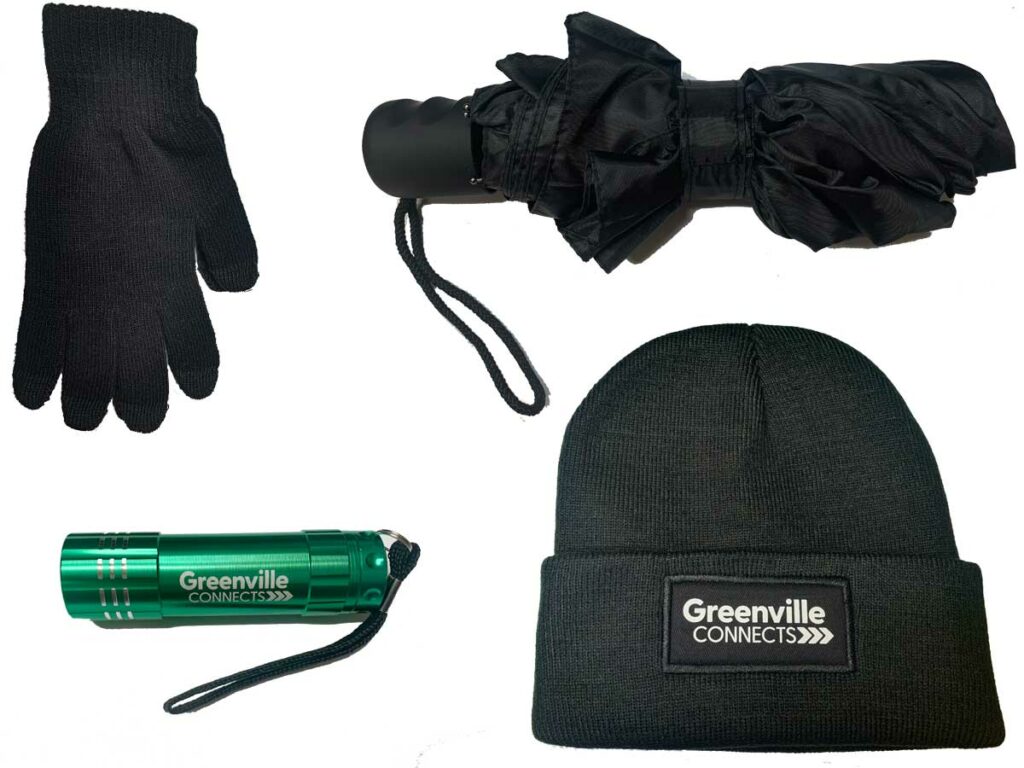Transit is Essential
Introduction
When South Carolina Governor Henry McMaster made the announcement to close schools and businesses on March 16, 2020, Greenlink – the public transit agency serving Greenville County – made changes for the safety of its customers. Rides were provided free of fares for March and April and fewer passengers were allowed on each bus to permit social distancing. Masks were (and still are) required, and Greenlink began giving them to customers for free.
In communities across the country, transit ridership declined precipitously; transit ridership nationwide dropped by 79% at the start of the pandemic (compared to ridership in 2019), and from June through December 2020, it remained about 65% lower than pre-pandemic levels.
But in Greenville County, transit ridership was far less impacted. Overall ridership in 2020 was down only 44% compared to 2019. Even compared to some of our peer communities in the Southeast (where ridership is more comparable to ours than a large metropolitan system’s would be), more riders stayed on our system (Charleston was down 73%, Chattanooga down 66%, and Birmingham and Greensboro both down 59%).
Why is this? Greenlink’s riders are essential workers. They have always been the folks who are meeting the daily needs of our community: working in our hospitals, restocking toilet paper and checking us out in grocery stores, providing child care and elder care, working in food processing, and handing meals through fast food drive through windows. Their work didn’t stop during the pandemic; in fact, it was even more important when non-riders were working from home. For the most part, they continued to go to work when COVID hit.
As rider Dorothy Waldrop, an environmental services tech in the emergency department at Bon Secours St. Francis, said, “Greenlink helps people get to work or get to where they’re going, and you need people to get to where they’re going, because that’s the economy. People can’t just sit at home and us have a great economy. People have to work either at a hospital or at a grocery store or other places, and people have to work not just for themselves, but for the community.”
James Foster
Krispy Kreme
James Foster has worked at Krispy Kreme for three years, and he’s never missed a day of work, even during the COVID-19 pandemic. He does everything from cooking, running the glaze, boxing and labeling doughnuts, and stacking boxes on racks for trucks to take to locations in the community. During the height of the pandemic, the store was closed to walk-in customers, and he missed seeing happy customers stand at the window watching the sweet glaze pour on the doughnuts as they run through the conveyer belt. But the drive through was as busy as ever as residents bought a box of Krispy Kreme doughnuts to cheer their coworkers and encourage their family and friends. He said, “During the pandemic, Krispy Kreme offered free doughnuts for health care workers, and it made me happy seeing all of the doctors and nurses in line to get a Krispy Kreme doughnut after work.”
He counts on Greenlink to get him to and from work on time. “It keeps me from having to walk to work.”

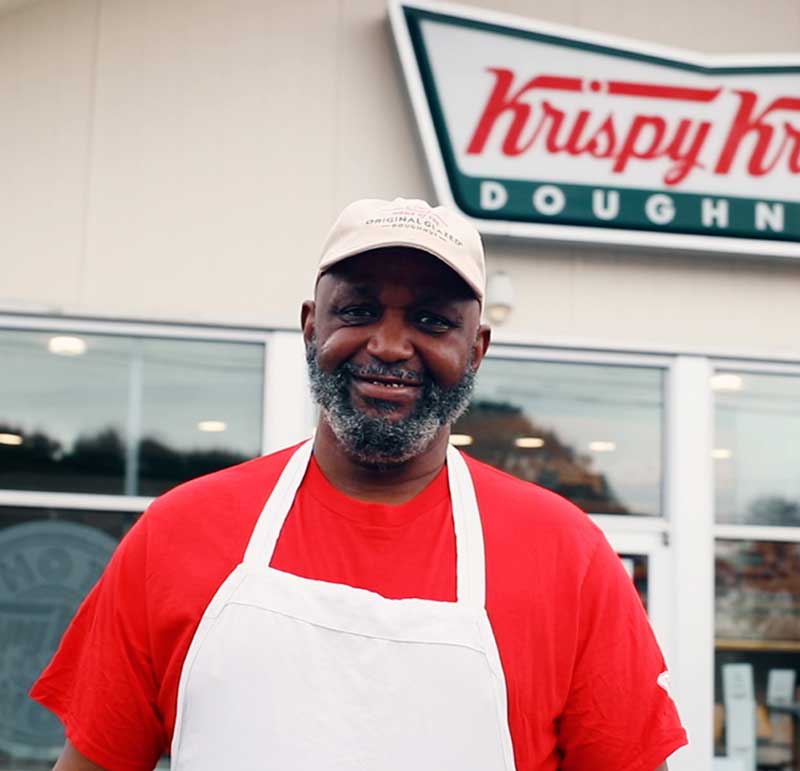
Transit’s critical role in post-pandemic Greenville County
What do we expect post-pandemic? Since the economy has re-opened, consumer demand has risen sharply, and many offices have returned to work. To that demand, we have added yet untold numbers of residents in our area.
As the Wall Street Journal reported from Greenville on April 27, 2021, in “Breakout Cities on the Forefront of America’s Economic Recovery:” “The pandemic is accelerating growth in midsize cities, positioning them to lead the charge in the nation’s economic rebound.
“Even before Covid-19, these rising stars…had been quietly building out vibrant economies in the shadow of bigger metropolises. During the pandemic, they have drawn workers and businesses with large and affordable homes, ample access to outdoor space and less congestion…
’They offer a lot of things you can’t really get in the big city,’ said Mark Vitner, senior economist with Wells Fargo & Co. ‘They’re more affordable, and it’s so much easier to live there.
“The pandemic-fueled flow of jobs and residents out of New York, San Francisco and other large coastal cities will subside and likely eventually reverse, economists say. But the economies in some of these smaller metro areas have staying power.”
Prior to the pandemic, we knew that Greenville County was on track for significant growth in the coming decades. In Greenville County’s 2019 comprehensive plan, more than 200,000 people were projected to move here by 2040. Newly released Census data shows that this is on top of the 70,000-plus growth we experienced between 2010 and 2020. And we knew then that transit was an important part of moving all of these new residents within our community.
But with so many new people arriving since COVID, this is even more true.

Dorothy Waldrop
Bon Secours St. Francis – Greenville
Dorothy Waldrop provides environmental services in the emergency department at St. Francis Downtown. She has always strived to provide care and support to patients and their families as she cleans their rooms. She knows from personal experience how frightening it can be to be in the hospital: she was hit by a car while cycling in 2002 and suffered a traumatic brain injury. So, when patients could not have a family member with them during COVID restrictions, Dorothy gave special attention to each person, letting them know she was there and that she cared about them.
Because of the accident, Dorothy no longer drives and relies on Greenlink and her bike to get her where she needs to go. Dorothy says, “The new extended hours (until 11:30 pm) mean I can ride my bike to work in the daytime and then safely ride [the bus] home at night when it’s dark.”
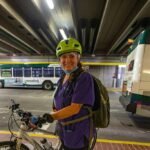

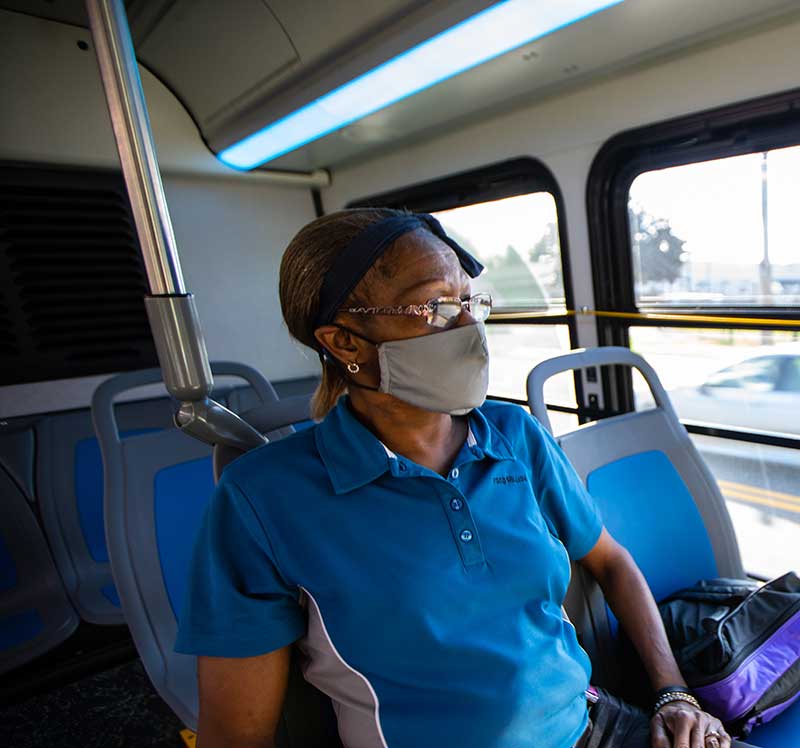
Laura Johnson
Food Lion
Laura Johnson has worked in grocery stores for eight years. She enjoys interacting with customers and checking out their purchases of food, cleaning supplies, paper products, and more. She also loves connecting with her customers – “but six feet apart!” she emphasizes. She says, “The hardest part [of the pandemic] was when some of my customers told me their stories of family members that passed away from COVID.” She understood their pain, because she lost family members to COVID, too.
She appreciates how Greenlink helps her on and off work. “I would just like to thank Greenlink for getting me to and from work safely. It’s a good feeling. You know? Cause I know my life is in their hands and they are a safe driver. I can just sit back and look out the window. Or if I know somebody riding the same bus, we get a chance to talk and interact.”
She loves her job, and says, “I would like to thank Food Lion for having me as a worker in a safe environment and Greenlink so I can get to and from work safely.”
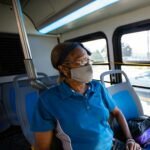
Transit Improvements Underway
How can we better serve our current essential workers who depend on the bus as well as all residents – current and newcomers – who will depend on riders who work in those roles? How can we better serve those in cars wishing for less congestion on roads?
Greenlink’s Transit Development Plan, which its leaders have methodically worked through over the last few years, is the roadmap. Even in the midst of a pandemic, Greenlink has continued to improve its services for riders.
Added seven new buses and paratransit vans to the fleet to replace old equipment
Replaced and upgraded the fareboxes to speed up the boarding process for customers
Launched a Commercial Driver’s License training program to fill driver vacancies to continue its plans for extended Saturday service hours to match weekday service
Secured funding to upgrade 85 bus stops to add upgraded passenger amenities such as shelters and benches and provide better accessibility
Began the design phase for a new maintenance facility. This facility is scheduled to open in 2023 and will lay the foundation for Greenlink to increase its maintenance capacity to add 11 buses to the fleet in order to expand to 30-minute service on most routes. Currently, customers wait an hour between service at most bus stops. Adding an additional bus to the route would cut a customer’s wait time in half, with a bus coming by every 30 minutes
Jenny Black
Prisma Health
Jenny Black has found a new opportunity to serve during the pandemic. She is a people person, and she loves her role in environmental services at Greenville Memorial Hospital where she’s worked since February 2021. Jenny cleans patient rooms, and she’s a trusted member of the team that interacts with patients, especially since family members haven’t been allowed to enter the hospital during much of the last year and a half. “I always introduce myself and let the patients know what I’ll be doing, and I ask if there is anything they need,” she says. “Then I ask how they are doing, and we visit while I’m cleaning.”
Jenny is modest about her role as an essential worker during a pandemic at a busy hospital. “It’s actually really humbling. It really is. I don’t see myself as an essential worker. I mean, I know I am, but I don’t see myself as that. I just go to work. I do what I love. I love everyone as I can and try to make the day better for everyone around me.”
She rides Greenlink to and from work, and it lets her off and picks her up right at the hospital. Jenny is especially grateful for a partnership in which Prisma sponsors Greenlink rides for its employees. She says, “That saves me $50 a month in fares, and I put it all in my savings account…Greenlink has allowed me to be there for those in need. You know, not just to clean your room, to be there for the patients, but be part of the hospital. So I can be there to contribute to the nurses and the doctors.”

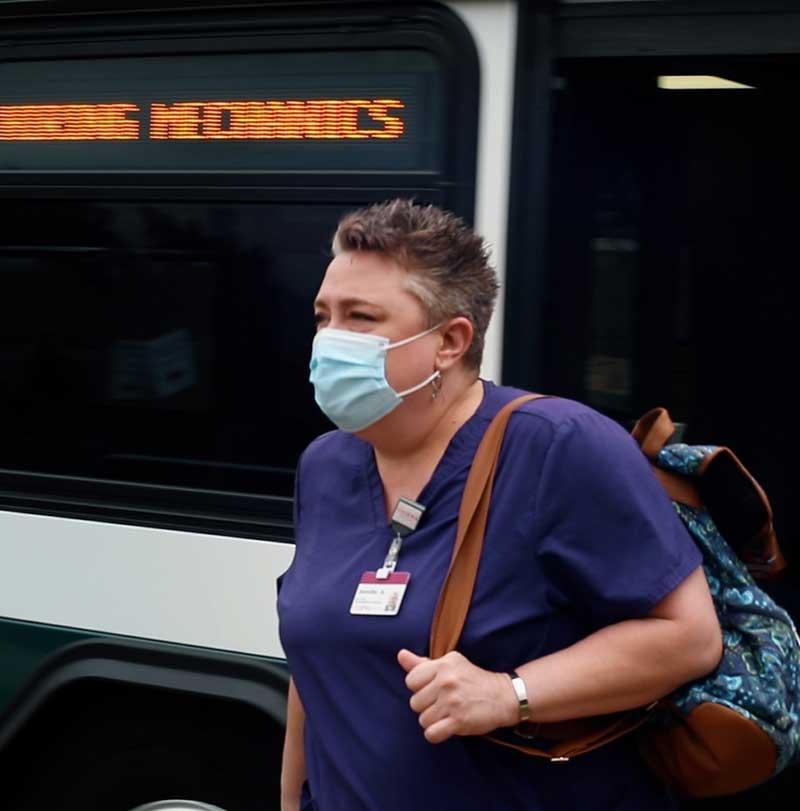
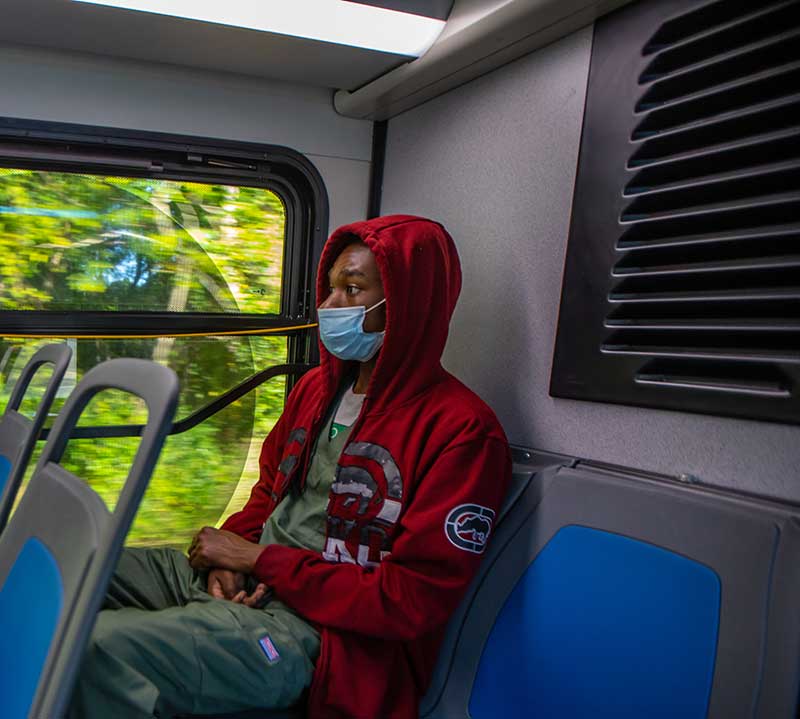
Dequan Downs
Project SEARCH
Dequan Downs graduated high school in the middle of the pandemic, and like so many in the class of 2020, he faced uncertainty about what was next. But thanks to Project SEARCH, an innovative program at Bon Secours St. Francis Health System providing internships to students with disabilities, Dequan was able to enroll in job training to prepare him for high demand employment. Now, he is learning responsibilities needed in health care, such as stocking supply carts, cleaning patient rooms, and transporting patients to cars after discharge.
He says he is proud to work alongside health care professionals at Bon Secours during this critical time. He says, “I clean and sanitize things to keep the patients getting well.” Dequan enjoys riding Greenlink for the freedom it gives him. “It’s quiet and clean, and the bus driver always greets you with, ‘Good morning.’”

Make a Donation
Join Greenville Connects in thanking our essential workers with gifts to make their rides easier this winter. Your contributions will help us distribute warm gloves and hats, umbrellas, flashlights, and reflective slap bracelets to Greenlink customers.
